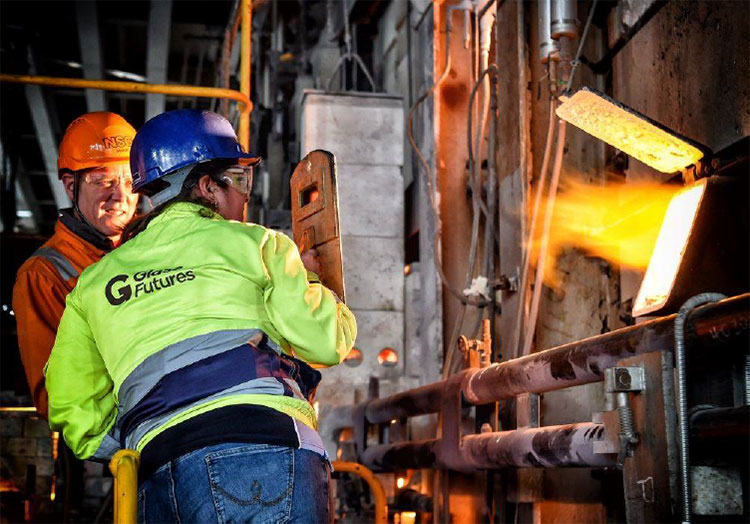Biofuel Trial by St Helens Glass Giant Marks New World-First Towards Decarbonisation
Pilkington United Kingdom Limited, part of the NSG Group, has become the world's first flat glass manufacturer to fire its furnace on 100% biofuel, as part of an industry trial to find sustainable alternatives to natural gas.
A sustainable biofuel made from organic waste materials powered the St Helens glass manufacturer's furnace entirely for four days, creating 165,000 sq ft of the lowest carbon float glass ever made. The fuel emits circa 80% less*1 CO2 than traditional natural gas used in the sector.
The trial forms part of a 7.1 million GBP project led by industry research and technology organisation Glass Futures, working under the Department for Business, Energy and Industrial Strategy's Energy Innovation Programme. It aims to demonstrate that the furnace could run safely at full production on the low-carbon fuel without impacting product quality.
Neil Syder, managing director at Pilkington UK, said: "Our world-first trial with Glass Futures proves how biofuel presents a realistic low-carbon alternative to natural gas, which will allow manufacturers to cut thousands of tonnes of CO2 from their production years ahead of alternative zero-carbon options becoming more readily available.
"Last Summer, we became the first glass manufacturer in the world to fire a furnace with hydrogen, which represented a major step forward towards our future as a net-zero industry. But a significant body of work remains before hydrogen and electrification become feasible alternatives to natural gas for glassmakers, making biofuels an important transitionary fuel.
"The success of this trial is also important for the many sectors that rely on glass as an integral supply chain material. We're now far closer to glass with less embodied carbon being accessible, which will help developers to create a more sustainable built environment."
Aston Fuller, General Manager at Glass Futures, said: "It is great to see a technology demonstrated on a container furnace one year ago be adopted onto a float line just one year later. Biofuel represents a real short-term opportunity for the UK glass sector to lead the way in sustainability among energy intensive industries, and this trial is another great example of what can be achieved when industry, academia and public partners work together to tackle the major challenges and opportunities of the future."
Energy & Climate Change Minister Greg Hands said: "These fuel switching trials, backed by over 7 million GBP in government funding, demonstrate how we are supporting industry to decarbonise and move away from relying on fossil fuels. This is vital to reducing emissions and driving forward the UK's green industrial revolution."
Speaking at a recent site visit, Councillor Mancyia Uddin, St Helens Borough Council's Climate Change Champion, said: "It was an honour to be invited to this demonstration in what was another world-first here in St Helens - the home of glass - to see how biofuel can become a sustainable alternative to natural gases, cutting CO2 emissions from the glass making process by an incredible 80 percent.
"As a council that has set its own targets to become net zero by 2040, it's great to see how industries are playing their part to cut carbon from everyday use, and we will continue to work closely alongside them to achieve this."
In a glass furnace, burning gas is pumped into a 20-metre-long chamber to heat it to 1,600 degrees celsius, causing raw materials including sand and recycled glass to melt to the consistency of treacle. This is then floated on top of a bath of molten tin, making the glass perfectly flat before being cooled.
Pilkington UK fired hydrogen on its glass furnace in August 2021 in a world-first trial as part of the HyNet Industrial Fuel Switching project*2 to decarbonise industrial processes across the North West of England.
In 2022, Pilkington UK marks 70 years since Sir Alastair Pilkington first began working on the float glass process from the company's base in St Helens. The United Nations is also recognising 2022 as the International Year of Glass, celebrating the past, present and future of the material.

Councillor Mancyia Uddin, St Helens Borough Council's Climate Change Champion at NSG's Greengate Site
*1 Biofuels, like natural gas, emit CO2 during combustion. However, plants, the raw material of biofuels, absorb CO2 through photosynthesis during their growth process, thus reducing the actual CO2 emissions.
*2 The HyNet project is part of the wider North West Energy & Hydrogen Cluster.
https://hynet.co.uk/
Sustainability Targets of NSG Group
With the medium-term vision of becoming a global glass supplier contributing to the world with high value-added glass the three-year period of the Revival Plan 24, with a view to achieve 21 percent reduction in 2030 compared to the 2018 levels and further to lay out its roadmap to achieve carbon neutrality by disruptive innovation.
Revival Plan 24
https://www.nsg.com/-/media/nsg/site-content/ir/ir-presentations/mtprp24presentation2021_e02.pdf
About NSG Group (Nippon Sheet Glass Co., Ltd. and its group companies)
NSG Group is the world's leading supplier of glass and glazing systems in the business areas of Architectural, Automotive and Creative Technology.
Architectural manufactures and supplies architectural glass as well as glass for the solar energy and other sectors.
Automotive serves the original equipment (OE) and aftermarket replacement (AGR) glazing markets.
Creative Technology comprises several discrete businesses, including lenses and light guides for printers and scanners, and specialty glass fiber products such as glass cord for timing belts and glass flake.
NSG Group Website: https://www.nsg.com
MEDIA CONTACT:
Phone: +81-(0)3-5443-0100 or please use the contact form on the web